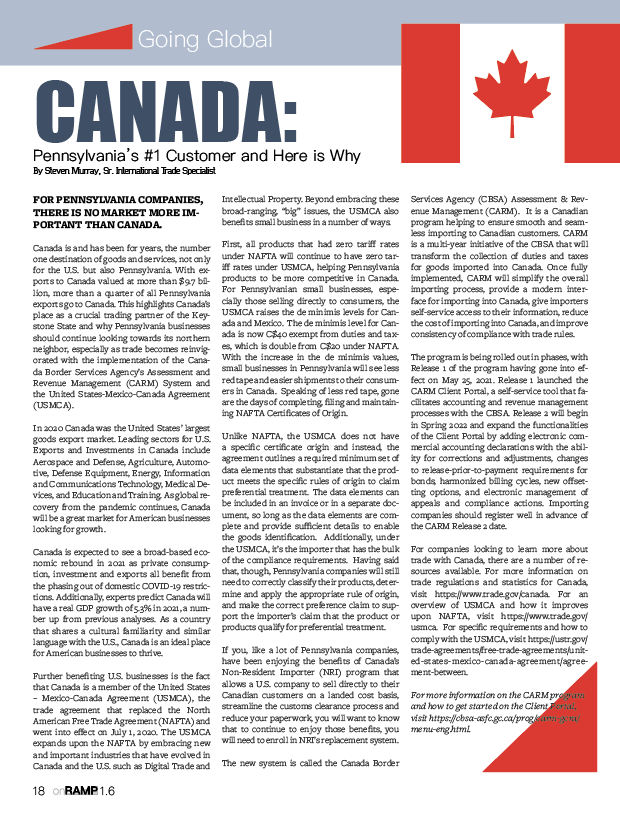Canada: Pennsylvania’s #1 Customer and Here is Why
By Steven Murray, Sr. International Trade Specialist
 For Pennsylvania companies, there is no market more important than Canada.
For Pennsylvania companies, there is no market more important than Canada.
Canada is and has been for years, the number one destination of goods and services, not only for the U.S. but also Pennsylvania. With exports to Canada valued at more than $9.7 billion, more than a quarter of all Pennsylvania exports go to Canada. This highlights Canada’s place as a crucial trading partner of the Keystone State and why Pennsylvania businesses should continue looking towards its northern neighbor, especially as trade becomes reinvigorated with the implementation of the Canada Border Services Agency’s Assessment and Revenue Management (CARM) System and the United States-Mexico-Canada Agreement (USMCA).
In 2020 Canada was the United States’ largest goods export market. Leading sectors for U.S. Exports and Investments in Canada include Aerospace and Defense, Agriculture, Automotive, Defense Equipment, Energy, Information and Communications Technology, Medical Devices, and Education and Training. As global recovery from the pandemic continues, Canada will be a great market for American businesses looking for growth.
Canada is expected to see a broad-based economic rebound in 2021 as private consumption, investment and exports all benefit from the phasing out of domestic COVID-19 restrictions. Additionally, experts predict Canada will have a real GDP growth of 5.3% in 2021, a number up from previous analyses. As a country that shares a cultural familiarity and similar language with the U.S., Canada is an ideal place for American businesses to thrive.
Further benefiting U.S. businesses is the fact that Canada is a member of the United States – Mexico-Canada Agreement (USMCA), the trade agreement that replaced the North American Free Trade Agreement (NAFTA) and went into effect on July 1, 2020. The USMCA expands upon the NAFTA by embracing new and important industries that have evolved in Canada and the U.S. such as Digital Trade and Intellectual Property. Beyond embracing these broad-ranging, “big” issues, the USMCA also benefits small business in a number of ways.
First, all products that had zero tariff rates under NAFTA will continue to have zero tariff rates under USMCA, helping Pennsylvania products to be more competitive in Canada. For Pennsylvanian small businesses, especially those selling directly to consumers, the USMCA raises the de minimis levels for Canada and Mexico. The de minimis level for Canada is now C$40 exempt from duties and taxes, which is double from C$20 under NAFTA. With the increase in the de minimis values, small businesses in Pennsylvania will see less red tape and easier shipments to their consumers in Canada. Speaking of less red tape, gone are the days of completing, filing and maintaining NAFTA Certificates of Origin.
Unlike NAFTA, the USMCA does not have a specific certificate origin and instead, the agreement outlines a required minimum set of data elements that substantiate that the product meets the specific rules of origin to claim preferential treatment. The data elements can be included in an invoice or in a separate document, so long as the data elements are complete and provide sufficient details to enable the goods identification. Additionally, under the USMCA, it’s the importer that has the bulk of the compliance requirements. Having said that, though, Pennsylvania companies will still need to correctly classify their products, determine and apply the appropriate rule of origin, and make the correct preference claim to support the importer’s claim that the product or products qualify for preferential treatment.
If you, like a lot of Pennsylvania companies, have been enjoying the benefits of Canada’s Non-Resident Importer (NRI) program that allows a U.S. company to sell directly to their Canadian customers on a landed cost basis, streamline the customs clearance process and reduce your paperwork, you will want to know that to continue to enjoy those benefits, you will need to enroll in NRI’s replacement system.
The new system is called the Canada Border Services Agency (CBSA) Assessment & Revenue Management (CARM). It is a Canadian program helping to ensure smooth and seamless importing to Canadian customers. CARM is a multi-year initiative of the CBSA that will transform the collection of duties and taxes for goods imported into Canada. Once fully implemented, CARM will simplify the overall importing process, provide a modern interface for importing into Canada, give importers self-service access to their information, reduce the cost of importing into Canada, and improve consistency of compliance with trade rules.
The program is being rolled out in phases, with Release 1 of the program having gone into effect on May 25, 2021. Release 1 launched the CARM Client Portal, a self-service tool that facilitates accounting and revenue management processes with the CBSA. Release 2 will begin in Spring 2022 and expand the functionalities of the Client Portal by adding electronic commercial accounting declarations with the ability for corrections and adjustments, changes to release-prior-to-payment requirements for bonds, harmonized billing cycles, new offsetting options, and electronic management of appeals and compliance actions. Importing companies should register well in advance of the CARM Release 2 date.
For companies looking to learn more about trade with Canada, there are a number of resources available. For more information on trade regulations and statistics for Canada, visit https://www.trade.gov/canada. For an overview of USMCA and how it improves upon NAFTA, visit https://www.trade.gov/usmca. For specific requirements and how to comply with the USMCA, visit https://ustr.gov/trade-agreements/free-trade-agreements/united-states-mexico-canada-agreement/agreement-between.
For more information on the CARM program and how to get started on the Client Portal, visit https://cbsa-asfc.gc.ca/prog/carm-gcra/menu-eng.html.